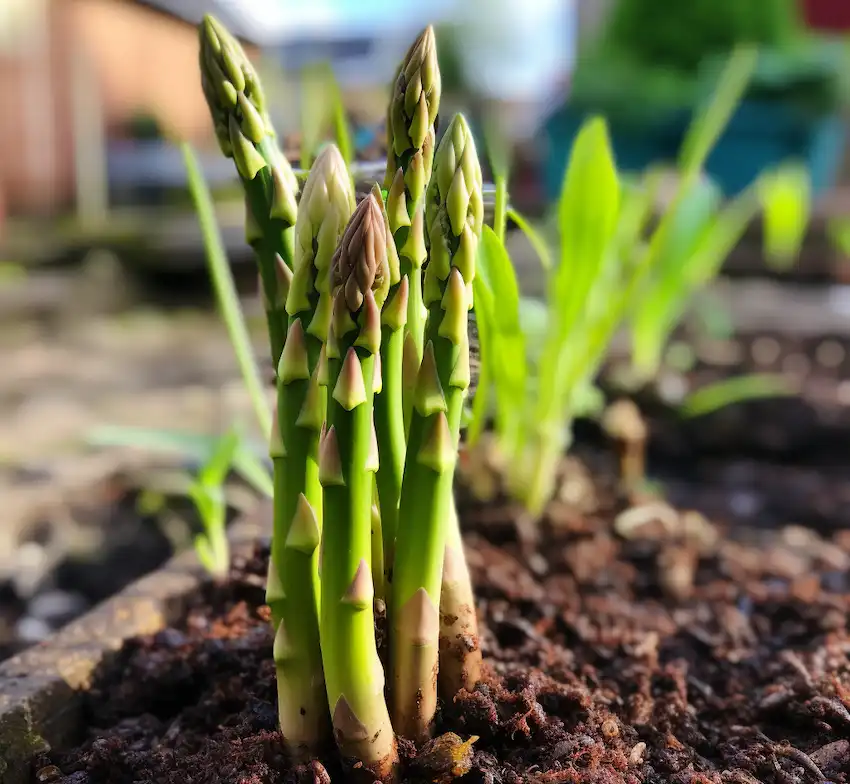10 Incredible Perennial Edibles for a Low-Maintenance Garden
Creating a garden that provides year-after-year harvests with minimal replanting is a goal for many gardeners. Perennial food plants are perfect for this purpose, offering a sustainable and low-maintenance solution. Unlike annuals, these plants come back each year, saving you time and effort. Here’s a guide to ten remarkable perennial edibles, including tips for planting, caring, and harvesting.
1. Asparagus (Asparagus officinalis)
Characteristics:
- Spears emerge in early spring, followed by feathery, fern-like foliage.
Planting Guide:
- When: Early spring.
- Where: Well-drained soil; full sun to partial shade.
Care Tips:
- Water regularly and mulch to retain moisture.
- Allow plants to establish for 2-3 years before heavy harvesting to ensure strong growth.
2. Rhubarb (Rheum rhabarbarum)
Characteristics:
- Known for tart red stalks and large green leaves.
Planting Guide:
- When: Early spring.
- Where: Fertile, well-drained soil; sunny or lightly shaded spot.
Care Tips:
- Water consistently during dry periods.
- Harvest stalks by twisting and pulling from the base. Leave at least two-thirds of the stalks on the plant to ensure vitality.
3. Jerusalem Artichoke (Helianthus tuberosus)
Characteristics:
- Produces edible tubers and tall, sunflower-like blooms.
Planting Guide:
- When: Early spring.
- Where: Well-drained soil; full sun.
Care Tips:
- Water regularly and watch for the stalks to die back in the fall.
- Harvest tubers after the first frost for optimal flavor.
4. Chives (Allium schoenoprasum)
Characteristics:
- Hardy herbs with a mild onion flavor; edible flowers bloom in late spring.
Planting Guide:
- When: Early spring or fall.
- Where: Full sun or partial shade; moist, well-drained soil.
Care Tips:
- Water regularly and cut back to the ground in winter.
- Divide clumps every 3-4 years to maintain vigor.
5. Mint (Mentha spp.)
Characteristics:
- Aromatic herb with various culinary uses; spreads vigorously.
Planting Guide:
- When: Spring.
- Where: Contained area or pot (as it can be invasive); partial shade and moist, well-drained soil.
Care Tips:
- Water consistently and cut back before winter.
- Harvest leaves before flowering for the best flavor.
6. Oregano (Origanum vulgare)
Characteristics:
- Hardy herb with a strong, zesty flavor; small white flowers bloom in summer.
Planting Guide:
- When: Spring or fall.
- Where: Well-drained soil; sunny spot.
Care Tips:
- Water regularly but avoid overwatering.
- Harvest leaves as needed, preferably before the plant flowers.
7. Sorrel (Rumex acetosa)
Characteristics:
- Leafy green with a tangy, lemon-like flavor. Best harvested young.
Planting Guide:
- When: Early spring.
- Where: Moist, well-drained soil; full sun to partial shade.
Care Tips:
- Water regularly and remove flowers to encourage leaf production.
- Harvest leaves from the outside, allowing the center to continue growing.
8. Kale (Brassica oleracea)
Characteristics:
- Leafy green with high nutritional value; more flavorful after frost.
Planting Guide:
- When: Spring or fall.
- Where: Well-drained soil rich in organic matter; full sun to partial shade.
Care Tips:
- Water consistently and mulch to retain moisture.
- Harvest outer leaves, allowing the center to continue producing.
9. Globe Artichokes (Cynara cardunculus var. scolymus)
Characteristics:
- Known for large, edible flower buds; striking architectural plant.
Planting Guide:
- When: Spring.
- Where: Well-drained soil; full sun.
Care Tips:
- Water deeply and regularly.
- Harvest buds when they are tight and before they open for the best flavor.
10. Blueberries (Vaccinium spp.)
Characteristics:
- Produces sweet, nutritious berries; requires acidic soil.
Planting Guide:
- When: Early spring or fall.
- Where: Sunny spot with well-drained, acidic soil.
Care Tips:
- Water regularly and mulch with acidic materials like pine needles.
- Prune bushes in late winter to encourage fruit production.
Incorporating perennial edibles into your garden is an excellent choice for sustainable, low-maintenance gardening. These ten plants offer a delightful array of flavors and textures, enriching both your meals and your gardening experience. With proper care and patience, you’ll enjoy a consistent bounty year after year. Embrace these perennial favorites and watch your garden—and your table—thrive season after season. 🌱🍇🌿
